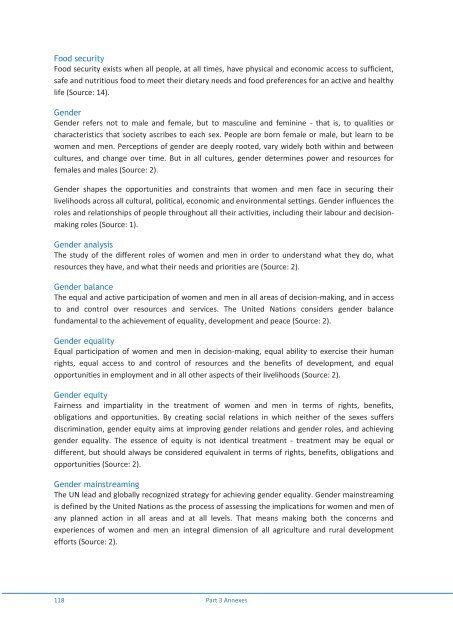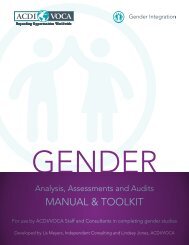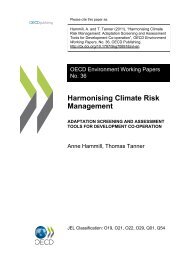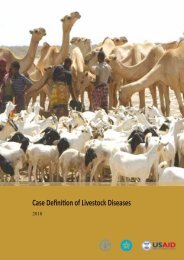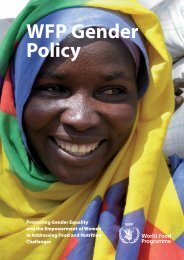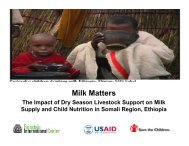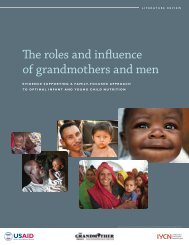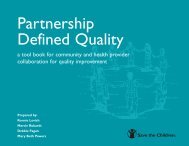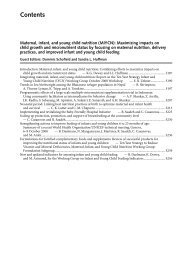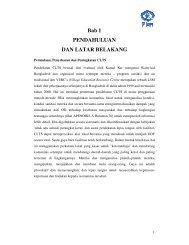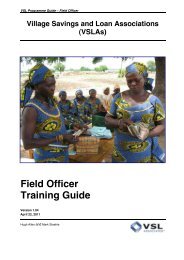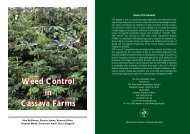Gender and climate change research in - FAO
Gender and climate change research in - FAO
Gender and climate change research in - FAO
You also want an ePaper? Increase the reach of your titles
YUMPU automatically turns print PDFs into web optimized ePapers that Google loves.
Food security<br />
Food security exists when all people, at all times, have physical <strong>and</strong> economic access to sufficient,<br />
safe <strong>and</strong> nutritious food to meet their dietary needs <strong>and</strong> food preferences for an active <strong>and</strong> healthy<br />
life (Source: 14).<br />
<strong>Gender</strong><br />
<strong>Gender</strong> refers not to male <strong>and</strong> female, but to mascul<strong>in</strong>e <strong>and</strong> fem<strong>in</strong><strong>in</strong>e - that is, to qualities or<br />
characteristics that society ascribes to each sex. People are born female or male, but learn to be<br />
women <strong>and</strong> men. Perceptions of gender are deeply rooted, vary widely both with<strong>in</strong> <strong>and</strong> between<br />
cultures, <strong>and</strong> <strong>change</strong> over time. But <strong>in</strong> all cultures, gender determ<strong>in</strong>es power <strong>and</strong> resources for<br />
females <strong>and</strong> males (Source: 2).<br />
<strong>Gender</strong> shapes the opportunities <strong>and</strong> constra<strong>in</strong>ts that women <strong>and</strong> men face <strong>in</strong> secur<strong>in</strong>g their<br />
livelihoods across all cultural, political, economic <strong>and</strong> environmental sett<strong>in</strong>gs. <strong>Gender</strong> <strong>in</strong>fluences the<br />
roles <strong>and</strong> relationships of people throughout all their activities, <strong>in</strong>clud<strong>in</strong>g their labour <strong>and</strong> decisionmak<strong>in</strong>g<br />
roles (Source: 1).<br />
<strong>Gender</strong> analysis<br />
The study of the different roles of women <strong>and</strong> men <strong>in</strong> order to underst<strong>and</strong> what they do, what<br />
resources they have, <strong>and</strong> what their needs <strong>and</strong> priorities are (Source: 2).<br />
<strong>Gender</strong> balance<br />
The equal <strong>and</strong> active participation of women <strong>and</strong> men <strong>in</strong> all areas of decision-mak<strong>in</strong>g, <strong>and</strong> <strong>in</strong> access<br />
to <strong>and</strong> control over resources <strong>and</strong> services. The United Nations considers gender balance<br />
fundamental to the achievement of equality, development <strong>and</strong> peace (Source: 2).<br />
<strong>Gender</strong> equality<br />
Equal participation of women <strong>and</strong> men <strong>in</strong> decision-mak<strong>in</strong>g, equal ability to exercise their human<br />
rights, equal access to <strong>and</strong> control of resources <strong>and</strong> the benefits of development, <strong>and</strong> equal<br />
opportunities <strong>in</strong> employment <strong>and</strong> <strong>in</strong> all other aspects of their livelihoods (Source: 2).<br />
<strong>Gender</strong> equity<br />
Fairness <strong>and</strong> impartiality <strong>in</strong> the treatment of women <strong>and</strong> men <strong>in</strong> terms of rights, benefits,<br />
obligations <strong>and</strong> opportunities. By creat<strong>in</strong>g social relations <strong>in</strong> which neither of the sexes suffers<br />
discrim<strong>in</strong>ation, gender equity aims at improv<strong>in</strong>g gender relations <strong>and</strong> gender roles, <strong>and</strong> achiev<strong>in</strong>g<br />
gender equality. The essence of equity is not identical treatment - treatment may be equal or<br />
different, but should always be considered equivalent <strong>in</strong> terms of rights, benefits, obligations <strong>and</strong><br />
opportunities (Source: 2).<br />
<strong>Gender</strong> ma<strong>in</strong>stream<strong>in</strong>g<br />
The UN lead <strong>and</strong> globally recognized strategy for achiev<strong>in</strong>g gender equality. <strong>Gender</strong> ma<strong>in</strong>stream<strong>in</strong>g<br />
is def<strong>in</strong>ed by the United Nations as the process of assess<strong>in</strong>g the implications for women <strong>and</strong> men of<br />
any planned action <strong>in</strong> all areas <strong>and</strong> at all levels. That means mak<strong>in</strong>g both the concerns <strong>and</strong><br />
experiences of women <strong>and</strong> men an <strong>in</strong>tegral dimension of all agriculture <strong>and</strong> rural development<br />
efforts (Source: 2).<br />
118 Part 3 Annexes


